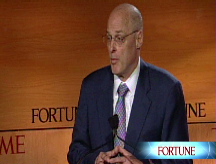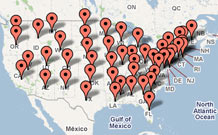Oil rises on talk of auto bailout, stimulus
Price rebounds from its lowest point in nearly 4 years as the deal to stave off carmaker bankruptcy seems close.
NEW YORK (CNNMoney.com) -- Oil prices rebounded from a nearly 4-year low Monday as U.S. automakers neared a deal that would keep them out of bankruptcy and President-elect Barack Obama pledged to stimulate the economy of the world's largest oil consumer.
U.S. crude for January delivery rose $2.90 to settle at $43.71 a barrel after settling at $40.81 Friday, the lowest close since Dec. 10, 2004.
Congressional Democrats and the White House reached a tentative agreement late Friday that could keep troubled automakers out of bankruptcy court through March, and prevent the disintegration of a large section of the U.S. economy, according to congressional sources.
Government support for the auto industry could certainly help, but "it's a temporary Band-Aid," said Phil Flynn, senior market analyst with Alaron Trading in Chicago.
Oil prices will be hard pressed to turn significantly higher unless they can rise back above $45.90 a barrel, cautioned Flynn.
In total, the U.S. auto industry employs about 2 million people nationwide, according to the Center for Automotive Research, which includes workers at General Motors (GM, Fortune 500), Ford (F, Fortune 500) and Chrysler, as well as dealers and parts manufacturers.
As the economy falters, consumers and businesses use less petroleum-based fuel, which drives down the price of oil.
House Speaker Nancy Pelosi, D-Calif., and Senate Majority Leader Harry Reid, D-Nev., issued statements this weekend that they would call the lame duck Congress back to Washington to vote on backing the auto industry.
"The U.S. auto industry is a critical part of our economy and we are encouraged by Speaker Pelosi's statement that Congress is expected to act next week," said Ford in a statement.
Concern about the waning worldwide economy's effect on oil demand has driven prices down more than $100 a barrel since hitting a record $147.27 this summer.
U.S. stimulus: In the U.S., Obama said his administration would ramp up spending on infrastructure, energy programs and school construction projects to create jobs and stimulate the economy.
"We understand that we've got to provide a blood infusion to the patient right now to make sure that the patient is stabilized. And that means that we can't worry short term about the deficit," he said in an appearance on NBC's "Meet the Press."
The possibility of infrastructure spending in the U.S., along with a steep discount in crude futures, may set the stage for a possible turnaround in 2009, according to James Cordier, founder of brokerage OptionSellers.com.
"There's a bit of light shining through the cracks," said Cordier, who believes a fair price for crude is around $50 a barrel.
Global stimulus: India, one of the world's rapidly expanding economies, pledged Sunday to provide an additional $4 billion on infrastructure, tax cuts and other stimulus measures.
And in China, the world's second largest oil consumer, leaders began weighing plans to expand a stimulus package, already worth about $586 billion, in order to protect the country from the global slowdown.
There is some fear that the global economic slowdown is spreading to Asia. Investors had long viewed the economies of China and India as untouchable by a U.S. recession. "The fact that they even have to talk about stimulus at this point is bearish in a weird way," said Flynn.
Possible OPEC cuts: Oil's rapid decline in price since July has been a major concern for countries that rely on oil profits, and December could see some large cuts in production.
The Organization of Petroleum Exporting Countries, an international trade cartel whose members produce about 40% of the world's oil, plans to meet next Wednesday in Algeria to discuss the problem.
The oil markets should prepare for a "severe" cut in production levels, according to OPEC President Chakib Khelil in an interview with The Associated Press.
Khelil did not say how much the organization would cut, but analysts estimate about 2 million barrels per day.
The organization already pledged to cut 1.5 million barrels per day at an emergency meeting in October. ![]()





